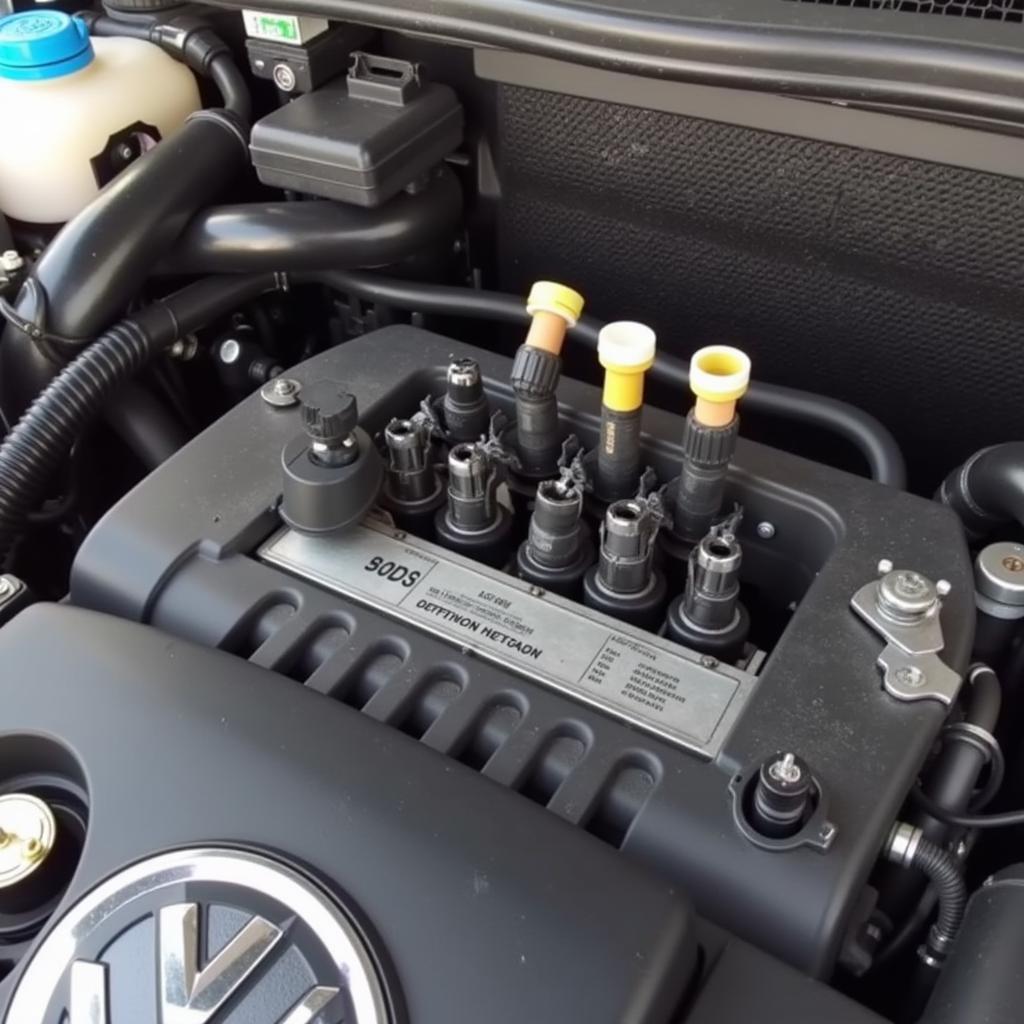Your cart is currently empty!

Conquering the Dreaded P0304 Code on Your 2010 VW GTI
A “check engine” light glaring from your dashboard is never a welcome sight, especially when it’s accompanied by the dreaded P0304 code. This code, specifically for 2010 Volkswagen GTIs, signals a misfire in cylinder 4, potentially impacting your car’s performance and fuel efficiency. But don’t fret! Understanding this common issue and its potential solutions can empower you to take charge and get your GTI back on track.
Decoding the P0304 Code: What Does it Mean for Your GTI?
The P0304 code essentially indicates that your GTI’s engine control unit (ECU) has detected a misfire in cylinder 4. A misfire occurs when the air-fuel mixture in a cylinder fails to ignite properly, causing a disruption in the engine’s combustion cycle.
 2010 VW GTI engine with P0304 code
2010 VW GTI engine with P0304 code
Common Culprits Behind the P0304 Code
Several components can contribute to a P0304 code in your 2010 VW GTI:
- Faulty Spark Plugs: Worn-out or fouled spark plugs are often the primary culprits behind misfires. Over time, the spark plug’s electrode can wear down or become coated with deposits, hindering its ability to produce a strong spark.
- Worn Ignition Coils: Ignition coils provide the high voltage necessary for the spark plugs to ignite the air-fuel mixture. A failing ignition coil can weaken or disrupt this electrical current, leading to misfires.
- Vacuum Leaks: Your GTI’s engine relies on a precise balance of air and fuel for optimal combustion. A leak in the intake manifold or vacuum hoses can disrupt this balance, leading to misfires.
- Fuel System Issues: Problems with the fuel injectors, fuel pump, or fuel filter can also contribute to misfires by disrupting the proper delivery of fuel to the cylinders.
- Faulty Oxygen Sensor: While less common, a faulty oxygen sensor can send incorrect data to the ECU, potentially causing it to misinterpret the air-fuel mixture and trigger a P0304 code.
Troubleshooting the P0304 Code: A Step-by-Step Guide
Before rushing to a mechanic, there are a few troubleshooting steps you can perform yourself:
- Inspect the Spark Plugs: Begin by visually inspecting the spark plugs in cylinder 4 for signs of wear, damage, or fouling. If they appear worn, replacing them is a good starting point.
- Check for Vacuum Leaks: Visually inspect the intake manifold and vacuum hoses for any cracks, loose connections, or signs of damage.
- Inspect Ignition Coils: While visually inspecting the ignition coils, look for any cracks, corrosion, or damage. You can also try swapping the ignition coil from cylinder 4 with another cylinder to see if the misfire follows.
When to Seek Professional Help
If the problem persists after these initial checks, it’s best to seek the expertise of a qualified mechanic. They have the diagnostic tools and knowledge to pinpoint the root cause of the P0304 code accurately.
“Remember, addressing engine misfires promptly is crucial,” says master mechanic John Miller. “Ignoring them can lead to more severe engine damage and costly repairs down the road.”
Preventing Future P0304 Codes
Prevention is always better than cure. Here are some proactive measures to help prevent future P0304 codes:
- Regular Spark Plug Replacement: Adhering to the manufacturer’s recommended spark plug replacement intervals is key.
- Quality Fuel: Using high-quality fuel can help prevent deposit buildup on spark plugs and injectors.
- Routine Engine Maintenance: Regular oil changes and air filter replacements contribute to optimal engine health and performance.
Conclusion
Encountering a P0304 code in your 2010 VW GTI can be concerning, but understanding its implications and potential causes empowers you to address the issue effectively. By following the troubleshooting steps outlined above and seeking professional help when necessary, you can overcome this common engine hiccup and get back to enjoying the thrill of driving your GTI.
If you are experiencing a P0304 code in your VW GTI, don’t hesitate to contact the experts at VCDSTool. We are here to help you diagnose and resolve your engine issues. You can reach us at +1 (641) 206-8880 and our email address: vcdstool@gmail.com or visit our office at 6719 W 70th Ave, Arvada, CO 80003, USA.
by
Tags:
Leave a Reply